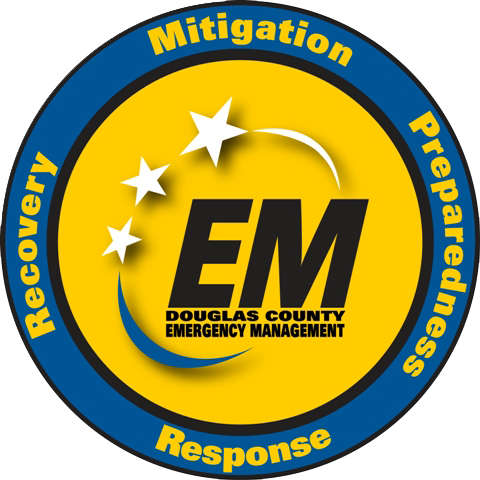Emergency Management
Volunteering with Douglas County Emergency Management
Volunteer opportunities are available and are utilized to support all four phases of emergency management.
Douglas County Emergency Management is tasked with many responsibilities according to the Local Emergency Operations Plan as well as local, state and federal laws and regulations. In order to appropriately fulfill some of these responsibilities, the services of volunteers are needed.
Emergency Volunteers help people prevent, prepare for, respond to and recover from emergencies. Douglas County Emergency Management (DCEM) offers a variety of volunteer opportunities. Much of this training is free. So whether you love the weather, are an amateur radio operator, or just want to be better prepared and help before, during and after disasters DCEM has three distinct ways to serve your community.
- Skywarn volunteers are authorized as weather spotters who report severe weather activity threatening Douglas County.
- The Auxiliary Communications Team (ACT) volunteers are licensed amateur radio operations who provide alternative communications capabilities.
- The Community Emergency Response Team (CERT) is a positive and realistic approach to emergency situations where initially ordinary citizens will be on their own and their actions can make a difference. Through this training, citizens will learn to suppress small fires, perform light search and rescue, shut off utilities (gas, water, electricity), provide basic first aid, and organize spontaneous volunteers until professional emergency responders arrive.
Other opportunities include:
- Outreach and Community Events: Volunteers educate citizens on potential disasters and how to become better prepared.
- Planned Events or Emergencies: Volunteers can be trained to deploy and staff accountability equipment to scan in and out event or emergency personnel and equipment.
- Helmet Fairs: Volunteers assist with traffic control during the event.
- Other County's Disasters: Volunteers have been sent as CERT members to assist in recovery efforts of other counties.
- Training Opportunities: Volunteers have the opportunity to aid in the instruction of new volunteers. Additional training opportunities are provided by Emergency Management, many times at the request of volunteers.
Only you can determine if you have the time to volunteer, but DCEM will work with you to provide rewarding experiences, whatever your schedule. You may choose to help with one–time events, like Helmet Fairs, Preparedness Fairs, or other volunteer opportunities. There also may be opportunities to work on short-term assignments, such as translating materials in other languages or creating flyers and brochures.
In general, no specific skills are required to volunteer. Emergency Management Volunteers come from different personal and professional backgrounds, with various skills and talents. Auxiliary Communications Team members will need an FCC issued amateur radio license. Training will almost always be provided to you for free.
Members of all three volunteer groups must meet these requirements:
- Have a primary residence in Douglas County or have a letter of approval from the Emergency Management Director of the county they are residing in.
- Be 18 years old or older.
- Be a citizen of the United States or have INS approval status.
- Successfully pass a background check completed by the Douglas County Sheriff’s Office.
- Successfully pass a drug screen conducted by a Douglas County approved entity.
Persons applying to become a member will follow this process:
- An application form is completed and submitted.
- If the application is approved, a copy of the applicant’s driver’s license, proof of insurance, and driving record will be submitted. A valid identification card can be submitted if no driver’s license has been issued.
- A background check form is completed and submitted next. The background check is conducted by the Douglas County Sheriff’s Office.
- If the background check results in building access being denied, the volunteer application is automatically denied as well.
- If the background check is passed, a volunteer orientation, policy, and procedure review is conducted.
- A drug screen will be conducted next and if passed, an Emergency Management Identification Card application will be completed and a DCEM identification card issued.
If not already completed, each volunteer must complete the Community Emergency Response Team (CERT) Course within the first 12 months of volunteering.
You can take the first step today by filling out and submitting an application below.
